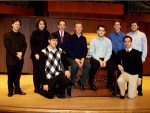Title
The Holtkamp organ in Paul Hall makes an imposing, though usually silent, backdrop for countless recitals and concerts each year. On February 10, however, this striking instrument will take center stage for the Juilliard organ department’s annual recital. Juilliard’s organ majors, all students of the department’s chair, Paul Jacobs, will present a varied program running from Mozart to Ad Wammes, a contemporary Dutch composer who began his musical career in a rock band.
Body
Keenan Boswell, a fourth-year bachelor’s/ first-year master’s student, chose the Wammes piece Miroir, because, he said, “it contains a soundscape unique to the organ”—a blend of minimalist influences with samba rhythms. Anyone convinced that the organ is just a solemn accessory to church music need only hear a few bars to see the new directions the instrument is heading in the 21st century!
Equally unique is the oldest piece on the program, Mozart’s Adagio and Allegro in F Minor, K. 594. The bizarre circumstances of its origin—it was written for a waxworks museum—do not diminish its stature as one of Mozart’s late masterpieces. It will be performed by first-year master’s student Christopher Houlihan.
Freshman Michael Hey will play the Variations sur un vieux Noël by Marcel Dupré, which display many of the distinctive colors of the organ. With characteristic French precision, Dupré indicates different stops, or sets of pipes, to be used in each variation. These range from basic organ tone to flutes, strings, and reeds. The organ cannot, of course, directly imitate orchestral instruments. However, as the Dupré and several other pieces on the program show, it has ample resources to play music of symphonic scope.
There is no Bach on the program, but I will play Felix Mendelssohn’s Third Organ Sonata. Mendelssohn, a virtuoso organist, performed Bach’s organ works alongside his own, and his blend of grandeur, strict counterpoint, and lyricism owes much to the influence of Bach.
Charles Tournemire’s Choral-Improvisation on Veni Creator, to be performed by senior Nicole Cochran, offers a glimpse into the world of improvisation. Organists are among the few classical musicians today who are still expected to improvise frequently. Tournemire, known for his mystical temperament and his mastery of improvisation, recorded this piece in 1930, and it was later transcribed for others to perform.
The program also has a local connection: David Crean, a first-year doctoral student, has chosen to play the Organ Sonata of Vincent Persichetti, who taught composition at Juilliard from 1947 until his death in 1987. The sonata showcases his unique, lyrical style, which drew on all historical periods and techniques without prejudice.
Finally, second-year doctoral student Ryan Jackson will present Maurice Duruflé’s Prelude and Fugue on the Name of Alain, written in memory of the brilliant French composer Jehan Alain, killed at age 29 in World War II. Duruflé transformed the well-worn form of prelude and fugue with lush harmonies and textures; his music has a wistful, quintessentially Parisian quality about it.
Although Juilliard’s organists can be heard in performance class every Thursday at 11 a.m., week in and week out, this is the first time in recent memory that the departmental recital has been held at Juilliard. Traditionally, nearby churches have hosted the event. With the organ in Alice Tully Hall still in storage, Paul Hall contains the only concert organ in Lincoln Center, and the department has decided to take advantage of it.
Paul Hall is an unusual venue for organ music, especially because it lacks the grand reverberation of many churches and cathedrals. “It’s a good space for chamber music,” said Jacobs, explaining that the small, intimate room demands very sensitive playing.
Nuance is crucial because organists must deal with far more machinery than other musicians. The keys and stop-knobs of the Paul Hall organ operate a complex system of bellows, windchests, magnets, and valves, all of which must function properly before a single note may sound.
Yet this “most mechanical of instruments,” as Jacobs puts it, nevertheless contains “extraordinary possibilities for artistic expression.” Some of these possibilities will be brought to life on the 10th by the nimble hands and feet of Juilliard’s organ department.





